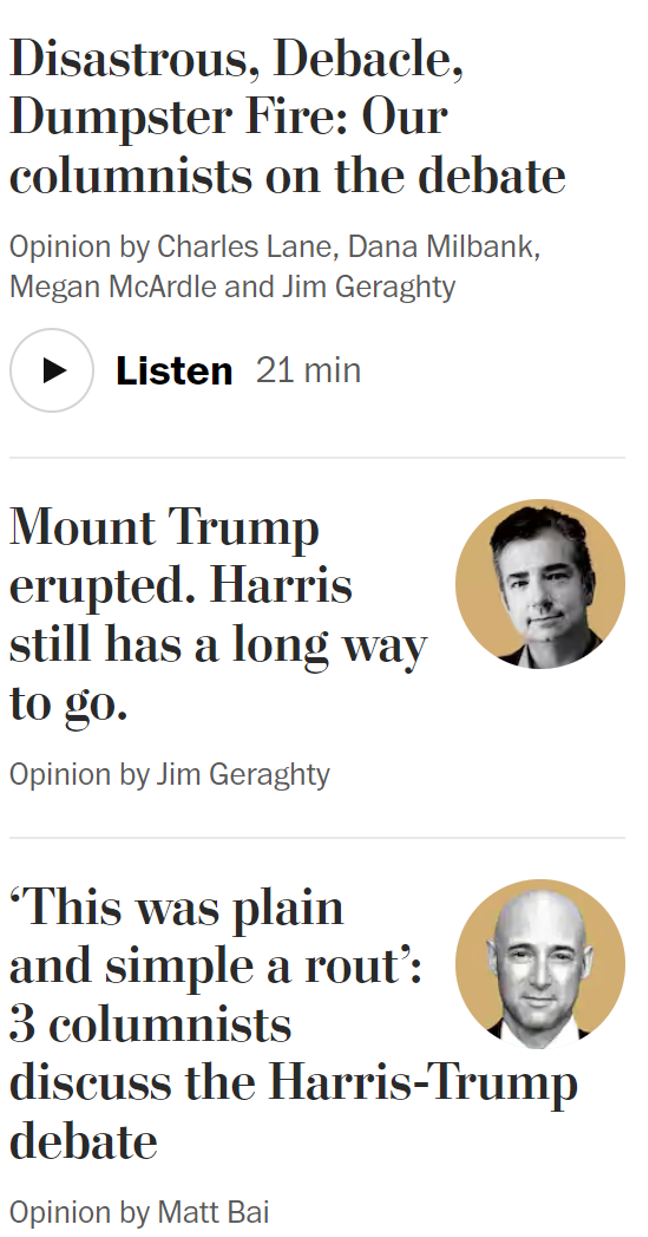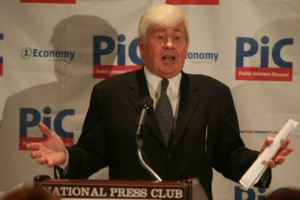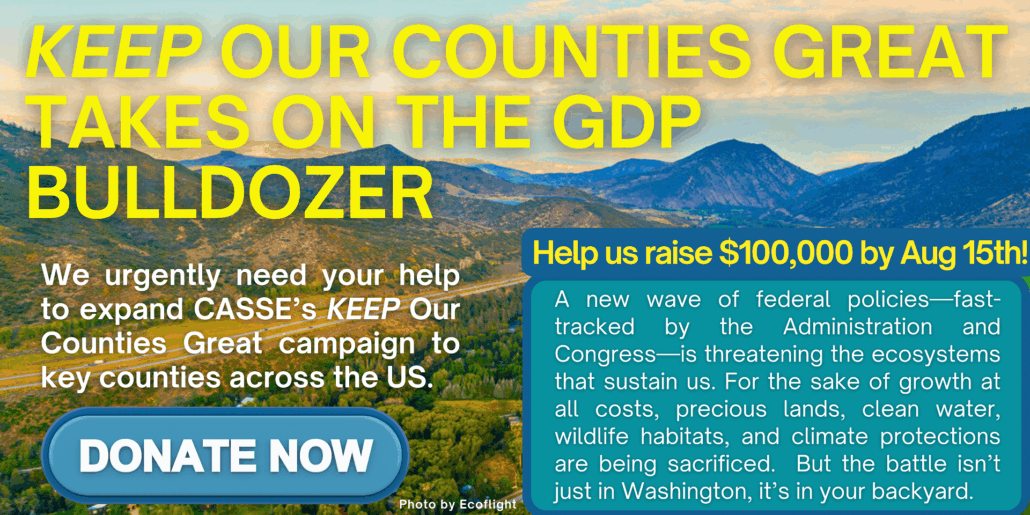A Steady Stater’s Response to the Harris-Trump Debate
by Brian Czech

Snip from Washington Post online the day after the Harris-Trump debate.
“Harris wiped the floor with Trump.” At least that’s how today’s Washington Post kicked off a discussion among in-house columnists. But for voters who prioritize Planet Earth for present and future generations, the 2024 presidential election is a classic example of seeking the lesser of two evils. Neither Kamala Harris nor Donald Trump is a student—much less a champion—of sustainability. They probably think “limits to growth” pertains to poll results or crowd size.
If sustainability was the key criterion for electoral success, beating either one of these candidates would be a very low bar. Given the miniscule altitude of their respective bars, it is astounding how much lower one of them manages to sit. I am reminded of a metaphor (slightly modified for present purposes), “Why, he was so low, he couldn’t kiss a snake with a stepladder.”
Yes, one candidate is the most extreme, recklessly pro-growth candidate in American history. The other is a moderate, fence-riding candidate on issues of growth, climate, and protecting Earth for posterity. No matter what happens, then, the U.S. doesn’t seem destined for an ecologically economic victory in November.
Let’s have a closer look at some of the highlights—and lowlights—of the “dumpster fire” in Philadelphia. Perhaps we can think of some pointers for candidates and moderators, present and future.
The Economy: Same Thing Only Different?
The economy was mentioned 24 times during the debate. As usual in presidential politics, nothing else received as much attention. Abortion was mentioned 21 times and the word “border” came up 20 times. Security—be it national, border, or social—got 13 mentions. Energy was addressed 9 times. Health care, 8 times. Guns, 5.

The “econ” syllables were prominent on debate night, September 10, 2024. (Gage Skidmore, Wikimedia Commons and Flickr)
If anything, the emphasis on the economy is underestimated by the number of “economy” utterances. “Economics” and “economists” came up often enough to put the figure at 34 instances of the “econ” syllables. Furthermore, jobs were mentioned 14 times, tariffs 12 times, and inflation 11. Several of the points about the border, too, were brought in primarily for their economic implications.
Yet, a closer analysis reveals something quite distinctive, relative to prior debates. The phrase “economic growth” was never used! In fact, neither “grow” nor “growth” was used a single time in a macroeconomic context. This is nearly unprecedented in the presidential debates of recent decades.
A more typical example was the 2016 debate between Hillary Clinton and Trump in Las Vegas. There, economic growth came up 20 times, and not with the slightest agnosticism. Clinton averred that “my plan is based on growing the economy,” while Trump claimed, “We’re going to grow the economy. It’s going to grow at a record rate of growth.” Similarly, economic growth came up 24 times in the 2012 debate between President Obama and Mitt Romney in Hempstead, New York. A quick perusal of past debates going back through the 1990s shows that “the economy, stupid” was nearly synonymous with the push for GDP growth.
Based on Tuesday’s spectacle, can we conclude that Harris and Trump have intentionally eschewed the pro-growth rhetoric? Hardly. Yet neither can we assume that limits to growth have had no effect on the body politic, the long arms of which are Harris and Trump.
Surely the dots are being connected, little by little, between a growing economy and profound challenges such as climate change, water shortages, and particularly portentous pollution problems like forever chemicals. Even if these cognitive connections reside largely in the subconsciousness of citizens, they are far from irrelevant. As political scientists Milton Lodge and Charles Taber pointed out, “unconscious thought underlies all political deliberation.”
So, there’s no call for celebration here, but to the extent that the paucity of “economic growth” in the debate is a reflection of an evolving subconsciousness of limits to growth, it’s progress we’ll take.
Growth Lurks Between the Lines
While there is probably some real progress in overcoming the obsession with “economic growth” in such explicit terms, a pro-growth position still lurks behind every corner. The position might be formal, as it remains (more or less) in Democratic and Republican Party platforms. But, just as with the subconscious awareness of limits to growth among a growing cohort of citizens, pro-growthmanship may come from a persistent subconscious habit. This habit would be most developed among politicians, especially older ones. Oldsters like Trump have deeper habits, by sheer passage of time. Also, they cut their political teeth in the decades of “it’s the economy.”
The knee-jerk, pro-growth habit is also prominent among political operatives at large. The growth agenda is a big tent uniting functionaries as far-flung as congressional staffers, economic advisors, agency directors, Supreme Court justices, political reporters, and debate moderators.
Subconscious pro-growthmanship manifests in many ways, on many issues. It tends to break or deny the connections between the dots. Instead of climate change, water shortages, and pollution problems being recognized as caused or exacerbated by economic growth, they are perceived as problems to be solved by growth. At best, they’d be considered disconnected problems awaiting technological solutions, with no relevance whatsoever to growth.

Linsey Davis tried to get climate change into the debate, but tepidly and with little success. (Rhododendrites, Wikimedia Commons)
What else would explain the near-nothingness about climate change to come out of the debate? The topic was kept off the table until the very last question, posed by Linsey Davis. She finally asked, almost apologetically, “We have another issue that we’d like to get to that’s important for a number of Americans, in particular younger voters, and that’s climate change. President Trump, with regard to the environment, you say that we have to have clean air and clean water. Vice President Harris, you call climate change an existential threat. The question to you both tonight is what would you do to fight climate change?”
It was Harris’s turn to reply first, and her answer was a mushy mix of factoids, anecdotes, and accusations against Trump. The most helpful statement was a simple one: “What we know is that it is very real.” But when it came to solutions, Harris’s acknowledgment of climate change was eclipsed by a shocking display of cognitive dissonance. She boasted, “I am proud that as vice president over the last four years we have invested a trillion dollars in a clean energy economy while we have also increased domestic gas production to historic levels.” It brought to mind President Obama’s 2014 State of the Union address, where he embraced fracked gas for its potential to create jobs and grow the economy, characterizing it as a “bridge fuel” toward “cleaner energy.”
The reality is that increasing domestic gas production is hardly a problem-solving response to the “existential threat” (Harris’s own words in an earlier interview) of climate change. You can’t have your cake and eat it too, Madam Vice President. You can’t solve the climate crisis by throwing fossil-fueled money at it. You left us wondering if you truly understand that generating a trillion dollars most certainly entailed those “historic levels” of domestic gas production—and other fossil fuels for that matter.
As for Trump… think snake and stepladder again. Harris could be a D-student of sustainability science and still hurdle the bar Trump sets by calling climate change a “hoax.” Sure, a relative handful at the political fringe still think climate change is a hoax—mostly due to blind following of Trump—but more and more Americans acknowledge climate change as the anthropogenic phenomenon it is demonstrated to be.
So What Should They Have Said?
On climate change, we can’t expect Donald Trump to come clean, even if he does understand the basics of greenhouse gas emissions and climate forcing (as anyone could). Trump displays a “malignant narcissism” that undermines and overrides his ability to care about the long-term welfare of others. You might say he applies an extreme discount rate, discounting especially the environment and various aspects of social justice.
A common theme among reporters covering the debate is that Trump left a lot of opportunities off the table because he was baited into defensiveness by Harris. Surely that was true, overall, but on the question of climate change, Harris also missed a golden opportunity. Instead of sticking with climate change for the duration of her 230-word answer, she turned the answer into a focus on “American manufacturing and opening up auto plants, not closing them like happened under Donald Trump.”
Yes, it was like Swiss cheese placed expertly on a mousetrap, and Trump fell for it in a flash. In his own, rambling, 233-word response, he never even uttered the word “climate.” The general media surely saw this as one last nail in the coffin of Trump’s debate performance. Perhaps it was, but going back to our criterion of sustainability, it backfired. Harris should have let Trump flail away about climate change, discounting it at best, calling it a hoax at worst, and generally displaying his climate ignorance. Instead of her turning the topic from climate to the economy—disappointing environmentalists in the process—she should have let him turn the topic, as he surely would have.

Only the late Jack Kemp rivalled Donald Trump in extremist growth rhetoric. (Austin Bonner, Wikimedia Commons)
Trump’s growth extremism was just waiting for an outlet. It was fresh in his mind, too. In a speech only five days prior in New York, Trump promised to “reignite explosive economic growth.”
If Trump dares to debate Harris again, you can bet his growth obsession will come out of the woodwork. The subconscious lessening of pro-growth rhetoric hypothesized above won’t shade Trump’s true colors for long. Next time, he could come out looking like Jack Kemp, the crazed candidate who blurted in a 1996 vice presidential debate, “We should double the rate of growth, and we should double the size of the American economy!”
That’s when Harris will have a golden opportunity to call Trump out for such economic extremism. Imagine her voice calmly prosecuting Trump’s recklessness with a statement such as:
“Well, we do need to keep unemployment and inflation in check. We need a solid, reliable mix of extractive, manufacturing, and service-oriented jobs. But if we care about our kids and our grandkids, we need our economic activity to be sustainable, too. ‘Explosive’ economic growth is not sustainable at this point in history. The way you get ‘explosive’ growth today—or try to—is by pulling out all the stops. You tear up the environmental regulations, privatize our national parks, and allow polluters to trash our soils, water, and air. You ‘drill baby drill’ and burn fossil fuels at a reckless rate. You undermine the financial security provided by minimum-wage laws, workmen’s comp, and unions. You weaken the safety nets of healthcare and social security. You jeopardize our hard-won relationships with trade partners. You do all these horrendous things, and for what? To grow the GDP? I don’t think it’s worth it, and neither do my fellow Americans. Sure, GDP growth was a great thing for a long time, especially those post-war decades of the 20th century. But here we are, two and a half decades into the 21st century, and we have to take a smarter approach to the economy. It’s not about growing the GDP any more, much less ‘explosively.’ It’s about protecting our assets—natural and social assets—and it’s about conserving the resources we need for future generations. And we definitely can’t continue choking our atmosphere with greenhouse gases. That would be the stupidest economic decision possible.”
All in Moderation
A politician can only do so much. The moderators of a presidential debate also play a key role in putting the most important issues before the candidates. If important issues have been overlooked by the campaigns, the moderators become that much more important.

For as long as presidential debates have been televised, moderators have been crucial for channeling content. Walter Cronkite set the standard in the 1960s. (Thomas J. O’Halloran, Picryl)
Imagine if a David Muir or Linsey Davis had asked, “Mr. Trump, you are on record as promising to ‘reignite explosive economic growth.’ Yet the evidence is overwhelming that economic growth—that means a growing population and more consumption—causes environmental deterioration. And we know the environment is essential for our economic future. What is your plan to protect the environment from the harms of explosive economic growth?”
Trump’s predictable response would be to deny any conflict between growth and the environment, along with his boast of protecting “the very cleanest air” and “crystal clean water.” But the astute moderator would ask Trump why, then, he rolled back the Clean Water Act so substantially in January of 2020.
Harris, then, would have a field day following up with the environmental sins of Trump. The political beauty of doing so would be to simultaneously immunize herself from present or future accusations of slow growth. From then on, having re-framed the GDP debate, her answer would come swift and easy: “It’s not just the economy, stupid. Anybody can grow the economy if they do enough damage. No, my focus is on the wellbeing of Americans. That means environmental, economic, and social wellbeing.”
From right or left, it’s hard to imagine folks disagreeing, isn’t it?
Brian Czech is CASSE’s Executive Director.



Questioning growth is a 3rd rail in US politics. Even the Greens argued for green growth. That seems to have changed. I am not & have never been a member of the Green Party but it is undemocratic that the media excludes green candidates from exposure, while the Democrats and Republicans engage in a suspiciously friendly embrace to exclude any Green or Libertarian candidate from debates. Brian’s article prompted me to check the Green Party platform. Here’s what I found: “Economic growth, as gauged by increasing Gross Domestic Product (GDP), is a dangerous and anachronistic goal. The most viable and sustainable alternative is a steady-state economy.”
Well stated, Mark. Check out: https://scaledown.substack.com
Unfortunately, this year’s election presents an “Alien vs Predator” scenario: whoever wins, we lose.
The reason “economic growth” wasn’t mentioned is not because either candidate has come to the realization that GDP is a bad measurement of well-being or that economic growth is at odds with environmental sustainability. Neither the GOP nor the Democrats want the Ponzi party to end. The lip service to climate change is just that and ignores the facts that climate ≠ environment and that climate change is a subset of a larger problem nobody wants to talk about, namely ecological overshoot.
Harris now supports fracking and while she might not say “drill baby drill,” she (or her supporters) are saying “build baby build.” It’s all about “abundance” (and not “shrinking to abundance”) via growth, powered by “green energy,” Jevons and energy sprawl and the laws of thermodynamics be damned.
Maybe this is all to be expected in a country run by corporate interests and growth-driven profiteering, in which money is speech and corporations are people.
Sadly, politicians don’t seem to understand that “stability” is literally embedded in the word and concept of “sustainability.”
Sadly, we live in a country and a world in which true sustainability and human well-being, which is interconnected with environmental well-being, are not really important because it’s all ‘bout the money.
Sadly, we live in a world and country in which the “Alien vs Predator” scenario is almost invariably a given reality of our electoral system and of our Ponzi society at large.
Give the Democrats credit for pushing the renewable energy transition. They put a trillion bucks into renewable energy initiatives. Keep in mind that Trump pulled out of the Paris Agreement. And told the fossil fuel industry if they gave him a billion dollars to win the election he would be all in for “drill baby drill.” There is a huge difference between the candidates when it comes to saving the planet. Pointing out that growth is not quite the word of the month shows tremendous progress. Shifting the “Overton Window” from “gotta growth” to “steady state” or even “less is more” will not happen all at once. But CASSE is making progress.
Thanks for writing this, Brian.
I’d say Wall Street won the debate — Big Oil, Big Food, Big Pharma, and Big War were all winners.
Sadly again, the Earth lost.
Thanks Brian for reminding us that it’s really about “environmental, economic, and social wellbeing”. But, this means learning to live within the means of the Earth’s ecological limits and mutually supporting one another in that “social wellbeing”. You and CASSE are leaders in this movement. We must reverse the reason for an economy from one that has commodified the natural world and human labor to concentrate and accumulate financial capital( to give us a false sense of freedom) to one that respects and addresses the needs of the natural world and human beings.
I actually talk to politicians about how growth and GDP obsession hurt communities and increase inequality. None of them get it. I was a long time member of the Green party (one of the founders) and the Greens do not get it, they are still caught up in industrial growth. The Greens threw me out because i would not agree to petition for candidates during the height of the first wave of Covid in 2020. They have also gone all in on Authoritarian approaches. In any case I probably go to more public hearings on the economy than anyone I have ever met and point out the fallacies of the growth model, but neoliberalism dies hard. We have a tough row to hoe to change that thinking. I do some of it by reminding the bureaucrats and politicians that economies are built from the bottom up , not the top down and that unless we invest in low income neighborhoods, and not in the fantasies of the rich, we are not going to have an economy.
Hello Greg, Why not organize to take the reins of the Green Party? It’s the only chance to directly affect politics in the U.S. A party is only as good as those running it at any one point in time. Tony https://scaledown.substack.com/publish/home
Brian, I loved this line: “But, just as with the subconscious awareness of limits to growth among a growing cohort of citizens, pro-growthmanship may come from a persistent subconscious habit.”
Followed by this line: “Subconscious pro-growthmanship manifests in many ways, on many issues. It tends to break or deny the connections between the dots. Instead of climate change, water shortages, and pollution problems being recognized as caused or exacerbated by economic growth, they are perceived as problems to be solved by growth. At best, they’d be considered disconnected problems awaiting technological solutions, with no relevance whatsoever to growth.”
Politics aside, we at the Qualicum Institute here in Canada, find pro-growthism prevalent throughout professional disciplines that have a legislated responsibility to protect the public and the environment. It leaves us shaking our heads.
Surprisingly, the many conservation and environmental groups we’ve reached out won’t touch limits to growth. Cognitive dissonance is alive and well.
Kind regards, Terri
My sense of it is there’s a total unawareness if the reality of the problem unless it rocks right up at yor own front door. I’m alright Jack is the mentality while for most people for now,.All and ourselves included, benefit from the comfortable living and false sense of economic seurity that growth provides. So the show stays on the road.
It’s a road to problems ahead, as we move closer to the problem more people will notice what’s up ahead. The unreal illusion of unending Gdp growth solving all our problems evermore, is akin to the illusion of the Empirorors fine invisible clothes. Hopefully; and before its too late, its realised that the Emperor be that Donald or Kamala is wearing no clothes.
From afar (Australia), it looks more like a reality-TV personality contest than a political debate. Questions tend to be in the form of “How do you feel about X?”, “What are your views on Y?”, and “How does your past reflect your beliefs?” Rally addresses also sound like responses to such questions. Very little on worthwhile goals and policies to achieve them. Virtually no substance. All carefully scripted to appease the media-dominating rich and powerful few who appear to have brainwashed most Americans.
Almost all of us are spectators/passengers of the growth-machine destroying the planet and civilisation. It’s been this way since the advent of agriculture and modern civilisation. The machine is ruled by the powerful minority who engage in chrematistic forms of behaviour, often at everyone else’s expense. Chrematistics is divisive and ecologically destructive. It’s sociopathic and not at all virtuous and needs to be publicly expressed as such. Chrematists have made small concessions over time to maintain stability of the system they rule. Trickle-down economics (distribution) has never been a truer term. However, chrematistics sows the seeds of its own destruction and has been the prime cause of the demise of many past empires/civilisations.
We need a socio-economic system based on the principles of oikonomia (effective management of the household (economy) for the sustainable and equitable benefit of society). Oikonomia is humanitarian. No modern, sophisticated economy is based on oikonomic principles. None ever have.
Our political institutions serve the interests of the chrematists (they were designed by them). The majority of the rest delude themselves by believing they live in democratic societies, where power is shared. Democracy is an illusion. We need to have open conversations about our political institutions and the need to reform them. Only then can we hope to establish an economy based on the oikonomic goals and principles preached by CASSE.
Hi Philip, I briefly looked at Oikonomics. The philosphers of old, pre the instant market economy truly had time to think things through. The themes in Oikonomics truly resonate with our current dilemma.
A need for more self sufficiency, which we gain true satisfaction and wellbeing from.
Less empty feeling, of a dead life – as we sell our hours working for market dollars. Instead a feeling of satisfaction from our working activity as we work cooperatively – our work, closely and clearly connected to our own, and others benefit.
An understanding that true satisfaction doesn’t lie in unnecessary accumulation (via the market) of wealth and little used items. Wealth is linked to the usefulness of the often used items, those items that enable you to have a well lived life. Oikonomics doesn’t place high value in diamonds or a vast array of little used personal items. Fresh air, clean water and food are the most valuable things. Our environment alongside the things we need and use daily have the most value. The whole concept is very attractive, a satisfied work life, more connected to self sufficiency with cooperation. A sense of being wealthy in having everything we need to live well with true value being clearly understood. If the modern world could be one of Oikonomics we can have all our beneficial conveniences, a less stressful ,more satisfied life, and maybe more time to think things through properly, like the philosophers of old who thought of the concept.
Harris & Walz could explain and promote a sustainable, steady-state economy and thus help elect Trump and pro growth Republicans. Are they and the Democratic Party in line with steady-state – no. But I don’t want another four years of Trump – talk about unsustainable and an unsteady economy!
I’m pretty convinced that the sort of priorities we saw in the US debate reflect a broader human problem: we tend to discount threats that have not actually bit us yet.
One sees this in ordinary life with medical and health concerns. Around the world, people know they should exercise a little more and eat a little healthier. But over and over, around the world, it often takes some sort of health scare or reckoning before many people try to make the necessary changes. There may be a name for this kind of behavior, I don’t know off the top of my head.
For those of us who care about the long term viability of human civilization and steady state economics, I think this means that we should be prepared to supply prescriptive policies not only for preventing a crisis from business-as-usual growth economics, but we should also work up prescriptive policies for what to do if a polycrisis is starting to unfold. Well, it is unfolding now, I suppose what I mean is: what can we recommend when a growth-induced polycrisis is dominating headlines.
I think the most likely outcome this century is that humanity will not react fast enough to prevent a crisis from economic growth, but humanity collectively will not be *entirely* stupid either. Again, most likely outcome, if I were a betting man: by 2060 at the latest, worried decisionmakers in most every society will be asking “So how do we prevent this from fully playing out the worst case scenario we just heard about? What do we need to do?”
It’s probably going to be rough, but my estimate is that again, humanity will sort of muddle through, with a LOT of pain and suffering that could have been avoided. And centuries of remediation will be required. But I think we can do a lot of good by having the prescriptive policies ready, with an eye to a scenario where things are starting to get bad, but there is still some room for coordinated action.
All national-level politicians in all nations are now in a catch-22. If you grow the economy, you burn the planet down. If you fail to grow the economy–or even grow it too slowly–you crash our fractional reserve banking credit based monetary system. Crashing the monetary system hard, like what some analysts expected in the Great Recession mortgage bubble burst, would rapidly lead to system collapse, with mass starvation and violent political upheaval on the menu.
There is no win here. It’s lose-lose all the way around.
And even if backing off from growth didn’t crash the system, unilaterally doing so would invite the other major powers to eat you for lunch. With no global governance system with any enforcement power, there is not sufficient trust among the major powers to engage in a blindfolded game of cooperation. The prisoners’ dilemma crops up instantly.
There is no way out at the Federal level, the International level, or the State level.
CASSE is on the right track with the Counties initiative. Counties and municipalities are our only hope.